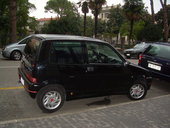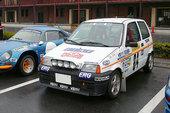Fiat Cinquecento

| |
| Fiat Cinquecento | |
|---|---|
| Manufacturer: | Poland |
| Parent company: | Fiat |
| Production: | 1991-1998 |
| Predecessor: | Fiat 126 Polski Fiat 126p |
| Successor: | Fiat Seicento |
| Class: | City car |
| Platform: | |
| Body style: | 3-door hatchback |
| Engine: | 704 cc ohv I2 903/899 cc ohv I4 1.1 L ohc FIRE I4 |
| Transmission: | |
| Wheelbase: | 2200 mm |
| Length: | 3230 mm |
| Width: | 1490 mm |
| Height: | 1435 mm |
| Weight: | 675-727 kg (1488-1603 lb) |
| Similar: | Daihatsu Cuore |
| Designer: | |
- "Cinquecento" may also refer to the earlier Fiat 500 or the modern Fiat Nuova 500.
The Fiat Cinquecento (Template:Pronounced in Italian, Template:IPAEng in English) was a city car designed by Giorgetto Giugiaro of Ital Design, launched by Fiat in late 1991 to replace the Fiat 126. It was the first Fiat model to be solely manufactured in the FSM plant in Tychy, Poland, which was just sold to Fiat by the Polish state, and where the production of the 126 (in its Polish variant, the Polski Fiat 126p) was still running. The production of the Cinquecento ended in 1998, when it was replaced by the Seicento.
The Cinquecento was available in one body style only, a small, angular 3-door hatchback, with a favorable drag coefficient of only 0.33 that bore similariies to the Lancia Y10. It featured several advances compared to older Fiat city cars, including independent suspension both in the front and in the rear similar to the FIAT Tipo, front disc brakes, side impact bars along with crumple zones incorporated in the design and galvanized body panels to fend off corrosion. Steering was by rack and pinion, and although power steering was never offered, the car could be ordered with a number of extras, including central locking, power windows, sunroof (or full-length retractable canvas roof in the Soleil version) and even air conditioning.
Engines
Unlike the rear-wheel drive 126, the Cinquecento was a front-wheel drive car. It was initially available with two engine choices, with the 1.1 L FIRE joining the lineup later. Interestingly, while the 704 cc engine was mounted longitudinally, the bigger units were fitted transversely, making the little Fiat one of the few cars in the world available with both configurations at the same time.
704 cc
The smallest engine, intended for sale in Poland only, was a 704 cc ohv two-cylinder unit, delivering 30 bhp DIN (22 kW. Cinquecento inherited this unit from the 126p BIS, an evolution of the 126p which was cancelled when the Cinquecento production started. In order to be fitted in the front-wheel drive Cinquecento, it underwent a major refurbishment (although the engine still employed a carburettor), which resulted, among other changes, in the crankshaft revolving in the opposite direction than in the 126p BIS!
903/899 cc
The bigger engine was the 903 cc 40 bhp DIN (29 kW) version of the veteran ohv four-cylinder engine, which saw service in many small Fiat models, starting with Fiat 850. It was fitted with fuel injection and was the base engine in most markets. Due to fiscal limitations, the displacement of this unit was limited to 899 cc in 1993, with a slight reduction of output, now producing 39 PS ECE (29 kW).
1.1 FIRE (Sporting)
In 1994, Fiat introduced the Cinquecento Sporting, featuring the 1108 cc SOHC FIRE 54 hp (40 kW) ECE engine from the entry-level Punto of the same era, mated to a close-ratio gearbox. Other additions were a 20mm drop in standard ride height, anti-roll bars, 13" alloy wheels, plus colour coded bumpers and mirrors. The interior saw a tachometer added, along with sports seats, red seatbelts and a leather steering wheel and gear knob.
It is the Sporting model which gave birth to a rallying trophy and a Group A Kit-Car version.
Tuning Options
1.2 8V FIRE
Although not a factory specified engine, many Cinquecento owners have installed the 1242 cc 8V FIRE engine from the Punto 60 into the Cinquecento due to it being a relatively straight forward swap. A good guide to the swap can be found here
Turbocharging
A few companies took on the task of turbocharging the 1108 cc and 1242 cc engines, namely Novitec and Van Aaken Developments (VAD). The VAD kit is the most widespread kit used in the UK and came in low and high compression applications and could be fitted in store or DIY. Unfortunately, the kit has been discontinued. The Novitec kit is probably the most widespread European kit used, but costs nearly 8000 Euro to get it installed. A few people have gone to the trouble of transplanting the 1.4 Turbo engine from an Uno Turbo into the cinquecento, but this is a very costly and time consuming transplant, requiring serious modification to the inner wings. A good turbo FAQ can be found here
Fiat Cinquecento concepts
In the mid 1990s, a number of concept cars based on the Fiat Cinquecento were developed by a number of design houses including one that featured half of the car's interior and a running board to place a bike. Another of these designs was the Lucciola, a proposal for a new Cinquecento by Giorgetto Giugiaro. However instead of the car becoming the next small Fiat city car, a version of the design ended up being put into production by the South Korean Daewoo Motors as their Matiz.
| <- Older Models | Fiat car timeline, European market, 1980s - present | |||||||||||||||||||||||||||||||||||||||
| Type | 1980s | 1990s | 2000s | 2010s | ||||||||||||||||||||||||||||||||||||
| 0 | 1 | 2 | 3 | 4 | 5 | 6 | 7 | 8 | 9 | 0 | 1 | 2 | 3 | 4 | 5 | 6 | 7 | 8 | 9 | 0 | 1 | 2 | 3 | 4 | 5 | 6 | 7 | 8 | 9 | 0 | 1 | 2 | 3 | 4 | 5 | |||||
| City cars | 126 | Cinquecento | Seicento (1998-2005) / 600 (2005-2010) | |||||||||||||||||||||||||||||||||||||
| 500 | ||||||||||||||||||||||||||||||||||||||||
| Panda I | Panda II | |||||||||||||||||||||||||||||||||||||||
| Supermini | 127 | Uno | Punto I | Punto II | ||||||||||||||||||||||||||||||||||||
| Grande Punto | Punto Evo | |||||||||||||||||||||||||||||||||||||||
| Small family car |
Ritmo | Tipo | Bravo / Brava | Stilo | Bravo II | |||||||||||||||||||||||||||||||||||
| 131 | Regata | Tempra | Marea | Linea | ||||||||||||||||||||||||||||||||||||
| Albea | ||||||||||||||||||||||||||||||||||||||||
| Large family car | 132 | Argenta | Croma I | Croma II | ||||||||||||||||||||||||||||||||||||
| Coupé | Coupé | |||||||||||||||||||||||||||||||||||||||
| Roadster | 124 Spider | Barchetta | Barchetta | |||||||||||||||||||||||||||||||||||||
| Sports car | X1/9 | |||||||||||||||||||||||||||||||||||||||
| Panel van/Leisure activity vehicle | Fiorino I | Fiorino II | Fiorino III | |||||||||||||||||||||||||||||||||||||
| Doblò | ||||||||||||||||||||||||||||||||||||||||
| Mini SUV | Sedici | |||||||||||||||||||||||||||||||||||||||
| Mini MPV | Idea | |||||||||||||||||||||||||||||||||||||||
| Compact MPV | Multipla | |||||||||||||||||||||||||||||||||||||||
| Large MPV | Ulysse I | Ulysse II | ||||||||||||||||||||||||||||||||||||||
| Van | Daily* | Scudo I | Scudo II | |||||||||||||||||||||||||||||||||||||
| Ducato I | Ducato II | Ducato III | ||||||||||||||||||||||||||||||||||||||
| Mini Pickup | Strada | |||||||||||||||||||||||||||||||||||||||
| Off-road | Campagnola (1107) | |||||||||||||||||||||||||||||||||||||||
| *Rebadged Iveco model | ||||||||||||||||||||||||||||||||||||||||

